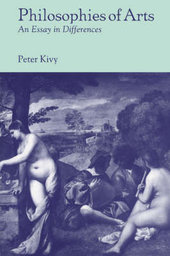
|
Philosophies of Arts: An Essay in Differences
Paperback / softback
Main Details
| Title |
Philosophies of Arts: An Essay in Differences
|
| Authors and Contributors |
By (author) Peter Kivy
|
| Physical Properties |
| Format:Paperback / softback | | Pages:260 | | Dimensions(mm): Height 230,Width 153 |
|
| Category/Genre | Theory of art
Philosophy - aesthetics |
|---|
| ISBN/Barcode |
9780521598293
|
| Classifications | Dewey:700.1 |
|---|
| Audience | | Professional & Vocational | |
|---|
| Illustrations |
Worked examples or Exercises
|
|
Publishing Details |
| Publisher |
Cambridge University Press
|
| Imprint |
Cambridge University Press
|
| Publication Date |
13 June 1997 |
| Publication Country |
United Kingdom
|
Description
Since the beginning of the eighteenth century, the philosophy of art has been engaged in the project of defining fine arts by finding out what they have in common. Peter Kivy's purpose is to trace the history of that enterprise and argue that the definitional project has been unsuccessful, with absolute music as the continual stumbling block. His fruitful change of strategy entails exploring the differences among the arts instead of engaging in an obsessive quest for sameness. He presents five case studies in both literature and music.
Reviews"Peter Kivy's book is an extraordinary work that combines a great depth of scholarship and forceful philosophical analysis and argument with a rich variety of engaging illustrations from the world of fine and literary arts. He not only provides the reader with a detailed historical analysis of the history of aesthetics from Plato to Danto and Walton, but in his pursuit of the differences between the arts, introduces a novel and compelling approach that will no doubt influence current debates. This work will be especially helpful to both professionals and advanced students of aesthetics." Mark Starr, Review of Metaphysics "There are few writers on philosophical aesthetics who are such a pleasure to read as Peter Kivy, so a new book by him is always reason for celebration...his book is always fresh and combative, analytic philosophy of art at its best." The Philosophical Review
|